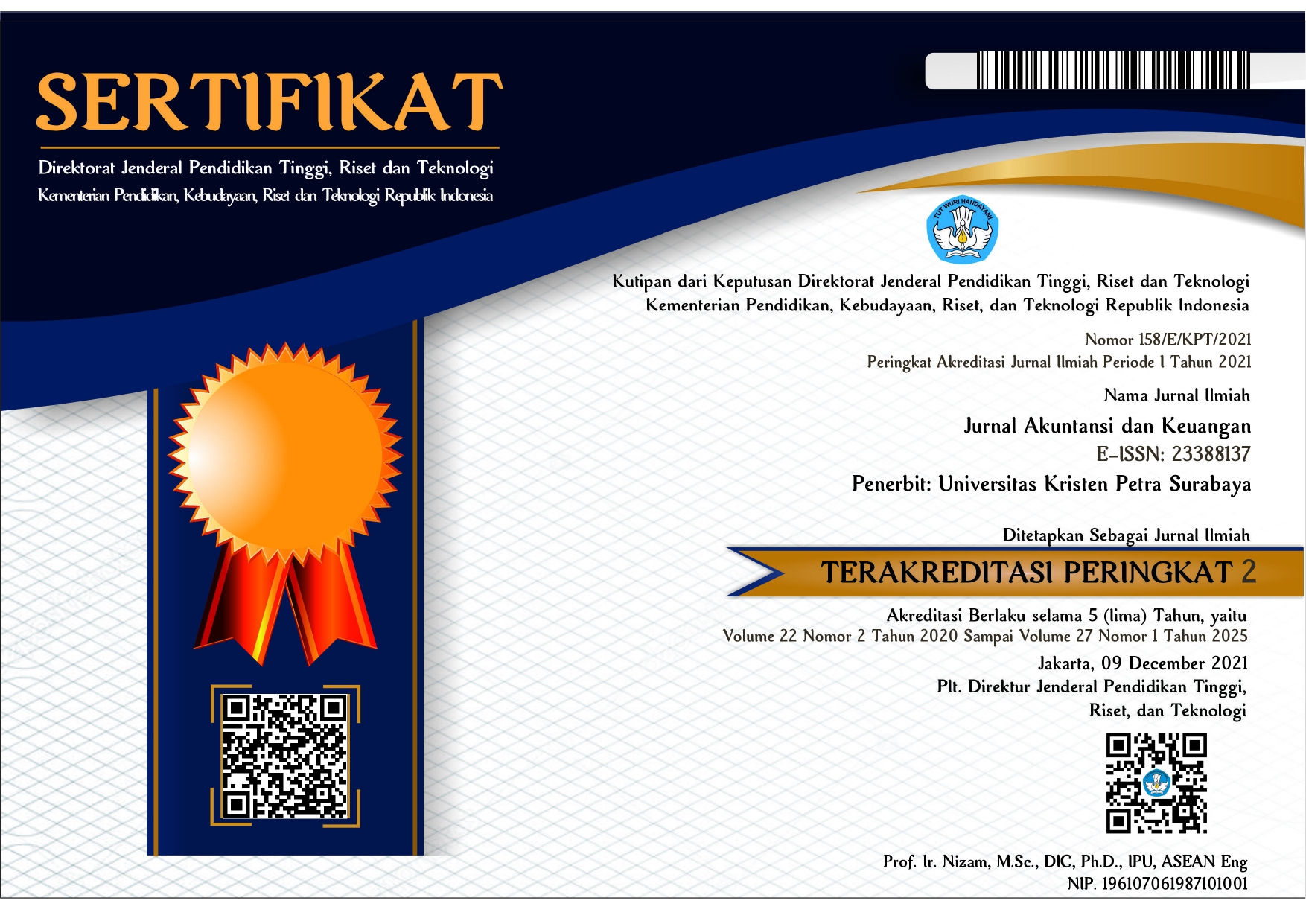ANALISA PERGERAKAN NILAI TUKAR RUPIAH TERHADAP DOLAR AMERIKA SETELAH DITERAPKANNYA KEBIJAKAN SISTEM NILAI TUKAR MENGAMBANG BEBAS DI INDONESIA
DOI:
https://doi.org/10.9744/jak.4.1.pp.%2069-78Keywords:
exchange rate, economic factors, non economic factors.Abstract
Since free-floating exchange rate system has been applied in Indonesia on August 1998, the accumulation of depreciation of rupiah against the US dollar has been about 48,7% until December 2001. This condition brings many argumentations about the reasons behind the exchange rate instability faced by Indonesia among many experts whether it is caused by economic factors or by non-economic factors. By recognizing the causes, it will be easier for the experts and government of Indonesia to formulate the solution. This research is intended to analyze the influence of economic variables, i.e. inflation, interest rate, money supply, national income in both Indonesia and The United State of America, as well as the position of the balance of international payment of Indonesia to the exchange rate movement in order to give contributions to solve the problem. Based on the result money supply becomes the only variable which has a significant influence on the exchange rate movement, instead of the other variables. Coefficient of determination of the research model is 32.5%, means that other factors, not accommodated in this research, give 67.5% influence to the exchange rate movement. These other factors can be catagorized as other economic factors or non-economic factors. Finally, it can be concluded that except the variable of money supply, most of the exchange rate movement is influenced by the other factors, which are economic factors or non economic factors. Abstract in Bahasa Indonesia : Sejak diterapkannya sistem nilai tukar mengambang bebas di Indonesia yang dimulai pada bulan Agustus 1998 nilai tukar rupiah terhadap dolar Amerika secara akumulatif telah terdepresiasi sebesar 48,7% sampai dengan Desember 2001. Kenyataan ini telah mengakibatkan perdebatan banyak ahli tentang sumber ketidakstabilan nilai tukar tersebut, apakah disebabkan oleh faktor ekonomi ataukah faktor non ekonomi. Dengan mengetahui sumber penyebabnya, maka akan lebih mudah bagi para ahli dan penyelenggara negara untuk merumuskan solusinya. Penelitian ini bertujuan menganalisis tentang hubungan berbagai variabel ekonomi, yaitu tingkat inflasi; tingkat suku bunga; jumlah uang beredar; pendapatan nasional di Indonesia dan Amerika Serikat, serta posisi neraca pembayaran internasional Indonesia, dalam mempengaruhi pergerakan nilai tukar rupiah terhadap dolar Amerika, dengan tujuan untuk memberikan kontribusi pemikiran terhadap proses pemecahan permasalahan tersebut. Dari analisis data diperoleh hasil bahwa hanya variabel jumlah uang beredar yang memiliki pengaruh yang signifikan terhadap pergerakan nilai tukar rupiah terhadap dolar Amerika, sedangkan variabel - variabel yang lainnya tidak. Dengan koefisien determinasi sebesar 32,5% mengindikasikan, bahwa 67,5% dari variabel terikatnya dipengaruhi oleh faktor-faktor selain faktor ekonomi yang dalam penelitian ini menjadi variabel bebas. Faktor-faktor lain tersebut bisa dikategorikan dalam faktor ekonomi lainnya maupun faktor-faktor non ekonomi. Dengan demikian dari hasil penelitian ini dapat disimpulkan, bahwa, kecuali variabel jumlah uang beredar, sebagian besar pergerakan nilai tukar mata uang rupiah terhadap dolar Amerika Serikat ditentukan oleh faktor-faktor lain, baik faktor ekonomi maupun faktor non ekonomi. Kata kunci: nilai tukar, faktor ekonomi, faktor non ekonomi.Downloads
Published
2004-06-14
How to Cite
Atmadja, A. S. (2004). ANALISA PERGERAKAN NILAI TUKAR RUPIAH TERHADAP DOLAR AMERIKA SETELAH DITERAPKANNYA KEBIJAKAN SISTEM NILAI TUKAR MENGAMBANG BEBAS DI INDONESIA. Jurnal Akuntansi Dan Keuangan, 4(1), pp. 69–78. https://doi.org/10.9744/jak.4.1.pp. 69-78
Issue
Section
Articles
License
Authors who publish with this journal agree to the following terms:
- Authors retain the copyright and publishing right, and grant the journal right of first publication with the work simultaneously licensed under a Creative Commons Attribution License that allows others to share the work with an acknowledgement of the work's authorship and initial publication in this journal.
- Authors are able to enter into separate, additional contractual arrangements for the non-exclusive distribution of the journal's published version of the work (e.g., post it to an institutional repository or publish it in a book), with an acknowledgement of its initial publication in this journal.
- Authors are permitted and encouraged to post their work online (e.g., in institutional repositories or on their website) followingthe publication of the article, as it can lead to productive exchanges, as well as earlier and greater citation of published work (See The Effect of Open Access).<a href="http://creativecommons.org/lice














